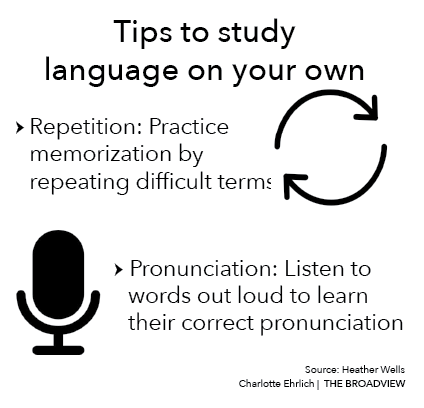‘Bonjour-ney’ towards language proficiency
Online tools can help develop conjugation, memorization skills
October 26, 2020
With the new block schedule that has a different two classes taught approximately every four and a half weeks,, students in modern and classical language classes are using new tools to asynchronously practice their proficiency.
“Duolingo helps me keep my practice going because it’s a force of habit by now,” sophomore Kiki Dauphin said about the
language fluency app. “I know that I have to do it everyday so it is easy to rely on, and it’s not even that hard to do.”
The flashcard program Anki and the conjugation practice tool Conjuguemos can both help to improve recognition of
conjugations and vocabulary, and increase auditory comprehension when students have four or more months between a language class semesters.
“Language is a muscle, and the more you use it the stronger it gets and the less you use it the more it gets weak,” Heather Wells, Department Chair of Modern & Classical Languages, said. “What’s really helpful when you’re learning a language is not just drilling a whole bunch of verbs and memorizing a whole bunch of vocabulary. The brain learns a language by seeing it in context.”
Acquiring language goes beyond an individual’s ability to memorize vocabulary and repeatedly conjugate a group of verbs. Emphasizing the learning process by moving from simple verbs and nouns to more complicated sentence structure is more effective in language development, according to Jesse Snedeker, a psychology professor at Harvard University.
“Reminding myself of little filler words and easy vocabulary is probably the easiest way that I retain my skills,” Dauphin said. “This next semester I’ll have cleaner sentences because I’ll know how to form them better.”
Language faculty and students are now working to develop a club that will help to practice skill and comprehension outside of class. Following a student interest survey sent to the school in early October, the club is now in its stages of formation.
Teachers are very sympathetic to the specialized schedule and expect challenges when reintegrating into the curriculum. With a more condensed schedule, students may emerge with stronger language skills than they were previously able to over the course of an entire semester, according to Wells.
Although online games and language apps can strengthen previous knowledge, some students like freshman Karina Abernethy do not find them useful.
“I think that using the websites helps me remember my Spanish, but I am not really learning very many new things from them,” Abernethy said. “I think I will be prepared for when Spanish starts back up again, but I will need a little refresher on some of the vocabulary and conjugations.”
Many apps rely on repeated testing and memorization to facilitate learning. Repeated retrieval of information by continuously studying vocabulary or conjugations, instead of just studying a set of words without being asked to recall them, can lead to long-term knowledge, according to Jeffrey Karpicke from the American Psychological Association.
“Being able to still practice my repetition every day even when not in school has helped me in the long run,” Dauphin said. “It is really different from class, but even without my teacher I feel like I’m getting the best possible option.”










